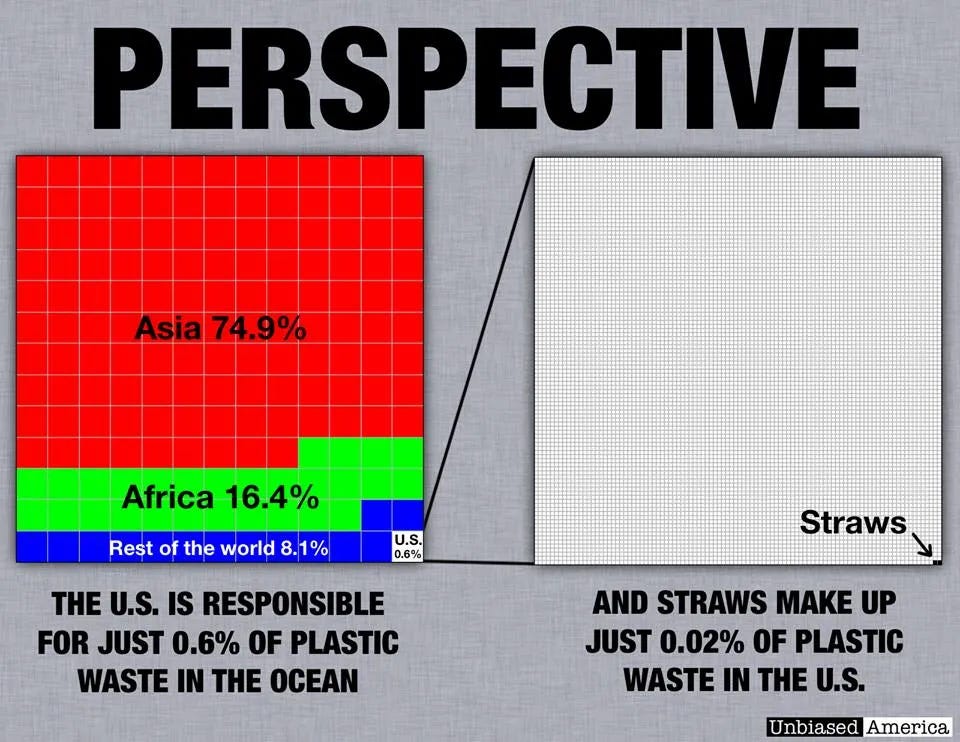Panic, Rinse, Repeat
While running some errands the other day, I opted to swing by the local Popeye's instead of making lunch at home. I got my usual spicy chicken sandwich with beans-and-rice and an unsweetened (collective gasp from the Southerners notwithstanding) iced tea. I was blessed with a plastic straw to accompany my plastic iced tea container and plastic container lid, and I flashed back to the great ecological panic of just a few years ago. That was when we all learned that those plastic straws were an existential threat to the planet, contributing (supposedly) to the giant plastic accretion in the Pacific Ocean.
I had this to say about straws and bags back then, and shared this bit of perspective:
One running gag was the wrapping of paper straws in cellophane plastic, whereas plastic straws are typically wrapped in paper. Another was the emergence of reusable metal straws, which served more than anything else to identify the virtue-signaling loons among us.
We are still, unfortunately, partially plagued with plastic bag bans (my supermarkets are all BYOB, but my local Chinese takeout still uses plastic shopping bags), meaning that I end up buying rather than reusing plastic bags to line my bathroom trash cans and to empty the cats' litter boxes. So it goes...
No one talks about plastics nowadays, because we have other existential panics to fret about. Americans only have enough bandwidth for a couple Issues Of The Moment at a time.
Know what else we're not talking about any more?
Bees.
As in Colony Collapse Disorder, as in "the bees are dying, and if they disappear, we will all starve."
Why aren't we talking about bees any more?
Capitalism.
Seems that, when there's a shortage, some see opportunity. Farmers don't necessarily rely on the vagaries of nature when they need pollination to happen. Some will rent bees from beekeepers, who'll bring colonies onto farms so that the bees can do their ecological duty. Beekeepers, in turn, can make more colonies. All they need is a good colony and a second queen (which can also be "made"). As this Reason article from 2017 notes, "honeybees are essentially livestock."
The hysterics are apparently shocked, shocked!, that a problem they went nonlinear over was resolved without massive government intervention. A WaPo headline tells the tale:
Some panics are more persistent than others, even as doomsday predictions fail to materialize time and time again.
Overpopulation is one such. Malthus was wrong 226 years ago, and Malthusians have been wrong over and over and over, ever since. Nevertheless, Paul Ehrlich peddled the same nonsense fifty-plus years ago, to the tune of two million copies of his book The Population Bomb.
Among Ehrlich's lulus from 1970:
The oceans will be dead as Lake Erie in less than a decade.
America will be subject to water rationing by 1974 and food rationing by 1980.
The death rate will increase until at least 100-200 million people per year will be starving to death during the next ten years.
Between 1980 and 1989, some 4 billion people, including 65 million Americans, would perish in the “Great Die-Off."
Ehrlich's failed predictions didn't stop present-day ninnies such as Naomi Oreskes from coughing up the same hairballs.
Climate catastrophe is another doomsday cult that won't go away, despite countless failed predictions. I won't go into how many times the "if we don't act by XXXX, it'll be too late" deadline has been moved back or retconned. Like all other doomsday cults, warmism relies on "our prediction remains correct despite our past predictions not coming true." Stuff about disappearing polar ice, worsening hurricanes and weather events, mass plant and animal die-offs, the end of snow in Great Britain, and on and on and on, including rates of warming, has been relegated to the "best left unmentioned" bin.
Meanwhile, virtually all the models have over-predicted warming. And that's even after the Best-and-Brightest in climate science retroactively fudged earlier temperature data in order to make the warming we've actually experienced seem greater than it is.
Why do we keep falling for panics?
Because humans are crisis-prone by nature. Overreact to a threat and you're more likely to survive. Under-react and you're more likely to be removed from the gene pool.
Because that aspect of human nature overrides rational thought, clouding our judgment and prompting us to responding emotionally.
Because people want to believe themselves smarter than their brethren, so being the first to Chicken-Little is rewarding.
Because people want to believe their brethren dumber than themselves, so those of us who resist jumping to the panic calls get quickly denounced.
Because people have figured out that this can be exploited, i.e. that panic sells.
Take note of the enduring panics vs the transient ones. No one's talking about plastic bags or straws, because there's no more money or political points in it. On the other hand, Malthusian overpopulation dovetails nicely with humans-destroying-the-planet climate hysterics, and both fit very well with socialistic agendas that put people in control of everyone else, so the idiocy persists.
As with everything else, Other People's Money is what it's all about. Or its evil twin - control over other people's lives. It's why we see the biggest global warming alarmists embracing socialism and central planning and denouncing liberty, free markets, and capitalism.
When it comes to the panic du jour, be a cynic and be a skeptic. Be open to being convinced by facts, but if someone is screaming "the sky is falling, we must act now!," take a deep dive into their motives before accepting their hysterics.





We don't hear about the frogs anymore either.
In 1969 NBC aired a special “Who killed Lake Erie”. By the 80’s it was coming back. I hate a lot of what the EPA does-CAFE rules, calling a puddle wetlands etc, but Lake Erie is a true success story.